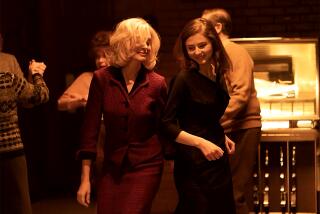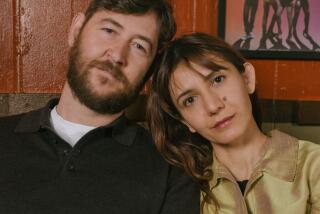‘Miss Austen’ on PBS wonderfully delivers the love and loss Jane Austen fans know by heart

- Share via
If I write, It is a truth universally acknowledged that to begin an essay with the words “It is a truth universally acknowledged” marks the writer out as a person of taste and good humor who has read Jane Austen, it is mostly to mark myself as a person of taste and good humor who has etc., etc. But it is a truth much acknowledged that we owe her more than that much-used opening gambit.
Because Austen’s prose is so elegant and clear, her wit so sharp, her comedy so dry, her irony so delicious, her observations so acute, her heroines so indomitable, her novels have lived on for two centuries. They offer a vacation destination for the mind, a world in which to luxuriate. Rich in characterization, compelling in their plots, fascinating in their social historicity, lively and lifelike in their dialogue, her books, published beginning in 1811, have the quality of seeming both of and ahead of their time, and they are particularly ripe for adaptation to the screen. Many readers see in them the roots of modern romantic comedy.
And because there are only seven finished novels, three of them posthumous and one never submitted for publication, and because we are a species that always wants more — or, said another way, can’t leave well enough alone — the ACLU (the Austen Cinematic and Literary Universe) continues to expand with sequels, pastiches, modernizations and reimaginings.
“Miss Austen,” a wonderful new limited series premiering Sunday on PBS’ “Masterpiece,” takes a biographical fiction approach. Adapted by Andrea Gibb from Gill Hornby’s 2020 novel, it centers on Jane’s sister, Cassandra — the title applies to either sister — whose historical claim to fame, or infamy, is that she burned the bulk of Jane’s letters after her death. (She is not made out to be a villain here.) It has many of the qualities of an Austen novel — because why else bother? — though having to adhere to the facts of actual lives does steer some plot lines in a darker direction.
The series runs in two timelines, full of parallel action and mirrored themes. In 1830, 13 years after the death of Jane Austen (Patsy Ferran), Cassandra (Keeley Hawes, deep and affecting) gets a message that the husband of the sister’s late friend Eliza Fowle (Madeline Walker) is dying. Cassandra rushes to their home, partly out of friendship — she is as good as an aunt to Eliza’s daughters Isabella (Rose Leslie) and Beth (Clare Foster), who, like the Austens, seem to be on a road to spinsterhood — and partly to lay her hands on Jane’s letters to Eliza, in order to keep safe from future historians whatever reflected badly on her sister.
Also after the letters is Cassandra’s self-important sister-in-law Mary (Jessica Hynes), who is also Eliza’s sister, who thinks they could provide material for a book on her late husband, Austen brother James (Patrick Knowles). In any case, they are mainly a device to send Cassandra, who finds and reads them secretly, into a series of flashbacks, some happy, some regretful, as she reflects upon her life with Jane and paths taken and not taken. Synnøve Karlsen plays the younger Cassandra, and if I may say so, recalls Jennifer Ehle, who played Elizabeth Bennet opposite Colin Firth’s Mr. Darcy in the peerless 1995 BBC “Pride and Prejudice.” (“You are my Lizzie Bennet to the root,” Jane tells Cassandra, seeming to agree with me.)
Author Gill Hornby and executive producer Christine Langan spoke about adapting Hornby’s novel for television and why readers and viewers continue to gravitate to Jane Austen.
Each storyline also finds the Austens and Fowles displaced from their homes into reduced circumstances. The Austen parents — optimistic father (Kevin McNally) and somewhat hysterical mother (Phyllis Logan) — could easily serve as Mr. and Mrs. Bennet in a “Pride and Prejudice” adaptation, while new vicar Mr. Dundas (Thomas Coombes), chasing the Fowles from theirs, feels like a deliberate callback to the obsequious Mr. Collins in “P&P.”
But the main thrust of the series is sisterly love and self-sacrifice, tangled with Austenesque questions of marriage and financial security, both between Cassandra and Jane, and in the “present-day” story line, Isabella and Beth Fowles. There is much presumptuous matchmaking as romantic possibilities come through the door and are sometimes shown it: tall, dark, ahistorical Henry Hobday (Max Irons) in the former case, described by Jane as “the model of perfection, which if I may say is most infuriating, for you know as a woman of many faults, I abhor faultlessness in others,” and a poor but dedicated doctor, Mr. Lidderdale (Alfred Enoch) in the latter.
“I must know if she is to be married!” cries Isabella, regarding Anne Elliot, the heroine of Jane’s “Persuasion,” which Cassandra has been reading aloud.

“Is that the only outcome that would be happy?” asks Cassandra.
“Yes.”
“Oh, Isabella, there are so many other ways for women like us to find happiness,” says Cassandra, underlining the comparison between the two sets of sisters. “Writing was Jane’s greatest love; she took great comfort from the heroes in her books. But in life, no man was ever worthy.”
Like Isabella, the viewer has their own ideas of happiness, of course, and, all things being equal would prefer a world in which romantic love comes to all. Then again, few of us are geniuses dedicated first to work that will transcend time. And not to spoil what must be obvious to everyone but the characters, but the Fowles story does provide clever opportunities for a conclusion more in keeping with the Austen corpus.
The finale should run you through a pack of handkerchiefs, unless you are some sort of heartless monster.
More to Read
The complete guide to home viewing
Get Screen Gab for everything about the TV shows and streaming movies everyone’s talking about.
You may occasionally receive promotional content from the Los Angeles Times.








